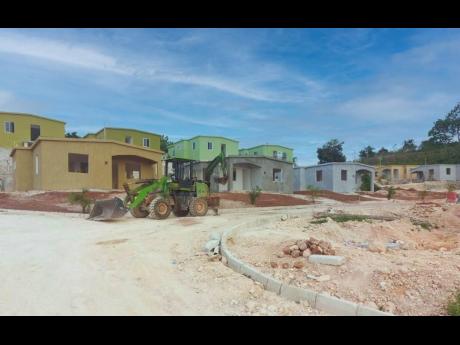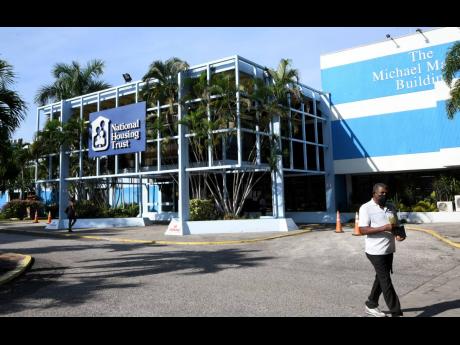NHT, Dexim Holdings settle dispute over $2.5b housing contract
Trust collared developer over non-delivery of 200 houses under deal
The National Housing Trust (NHT) has reached a settlement with Dexim Holdings Limited, the developer it sued for allegedly not delivering any of an agreed 200 houses despite paying over $650 million under a $2.5-billion contract.
“There was a mediated settlement reached,” said Michael Williams, the attorney for Dexim, in response to Sunday Gleaner questions on what took place at a Supreme Court hearing last Tuesday.
He said the court gave a “consent order”, meaning that both parties agreed to a decision, but he declined to give specifics.
Williams also declined to discuss the settlement and case, although calls are likely to emerge for details, given large sums involved and the issues that prompted NHT to go to court. They are represented by DunnCox law firm.
The NHT, the State’s multibillion-dollar residential home builder that operates out of the Office of the Prime Minister, acknowledged receiving questions from The Sunday Gleaner last Wednesday but failed to respond to any up to press time last night.
The case revolves around Dexim’s 47-acre Out of the Blue housing development in Discovery Bay, St Ann, and the NHT’s lawsuit filed on September 19, 2022, after problems emerged in the deal inked August 2019.
The NHT sought the court’s urgent intervention to stop Dexim from allegedly selling lots assigned to the Trust and to honour an agreement.
Not being truthful
Dexim denied the assertions and accused the NHT of not being truthful and acting prematurely by going to court.
Dexim Holdings was incorporated in 1999 and currently has George Neil and his wife Natalie as directors. Neil and Peter Young are listed as shareholders, according to Companies Office of Jamaica records.
The case has opened the NHT to scrutiny for entering into a multibillion-dollar business arrangement in 2019 with a company led by Neil.
Three years earlier, in July 2016, the Office of the Contractor General (now Integrity Commission) warned the Holness administration against granting a telecoms licence to Symbiote Investments, because of, among other things, “adverse traces” against Neil, a former director.
Despite the recommendation, Prime Minister Andrew Holness announced in Parliament in September 2016 that the Government had approved the $2.7-billion cellular licence. Symbiote traded as Caricel.
But less than a year later, the government announced it was revoking the licence, an action Caricel said was “the most blatant and outrageous act of discrimination perpetrated by the Government of Jamaica”.
The Government never acknowledged reports that the United States, Canada and the United Kingdom had concerns about Caricel.
NHT and Dexim signed a guaranteed purchase agreement on August 28, 2019, four months after the company approached the NHT, according to an affidavit dated September 19, 2022, by Michael Taylor, the assistant general manager in charge of project management at the housing agency.
Under guaranteed purchase agreements, the NHT partners with developers by agreeing to buy housing units in a development for contributors.
The NHT says it undertakes the marketing risks regarding the units it purchases while the developer accepts all the risks associated with planning, designing, financing and completing the housing solutions.
According to Taylor, the NHT committed to buying 200 two-bedroom and two-bathroom units at a “fixed price” of $12.5 million per unit to be delivered in the first phase of the development. There was no provision for escalation costs.
The agreement outlined that construction was to start no later than October 1, 2019, with completion by September 30, 2021.
The agreement was amended on January 26, 2021 and the deadline for the provision of the units moved to August 31, 2022.
The NHT said there was no change to the specification for each house to be 830 square feet and designed to allow for the addition of a third bedroom. Each land size was to be 3,000 square feet.
Taylor also said identification of the lots on which the 200 units were to be built was left out of the agreement because at the time it was signed, the subdivision of the property was not yet finalised.
He said in a letter dated November 15, 2019, the company specified the lots assigned to the NHT. It was also determined that the 200 units would be delivered in four batches of 50.
Before receiving the designs, the NHT disbursed an initial $500 million to Dexim, an amount that represents 20 per cent of the $2.5 billion purchase price for the houses, Taylor said in his affidavit. Advances are standard in these arrangements.
On November 12, 2019, Dexim issued NHT an advance payment bond, essentially a contract that allows the NHT to be repaid if the company fails to deliver.
The NHT gave another advance of $150 million in January 2021 and the company that month also executed a similar advance payment bond.
Taylor explained that the Trust made a second payment because “the circumstance was that construction works were in abeyance for approximately six months and the company requested the advance to facilitate completion and delivery of the Trust’s units”.
Emphasis was placed on the first 50 units and the Trust “agreed” to provide the additional $150 million as “working capital”, Taylor said.
In outlining a series of alleged breaches, Taylor pointed to the late submission of the designs, noting that ones the NHT “deemed suitable” were provided in July 2020.
The senior NHT official argued that despite the extended timeline for the delivery of NHT’s units, Dexim “has not to date delivered any housing units to the Trust and … has … entered into agreements for sale to third-party purchasers for housing units on lots in the development assigned to the Trust”.
NHT said it rejected Dexim’s request for an extended deadline.
Dexim reportedly indicated that it had “difficulty” complying with the terms of the agreement because of factors including the COVID-19 pandemic.
But Taylor dismissed that argument, saying the law used by the Government to respond to the crisis made exceptions for persons working in the construction industry.
Other alleged breaches included Dexim having “most of the housing units” on lots assigned to NHT “in excess of the 830 square feet requirement or with more than two bedrooms as agreed.
“The Trust is placed in an unenviable position, having advanced significant capital outlay to the company for almost three years and having invested significant time and effort towards a certain anticipated housing yield within an agreed timeline, in circumstances where the company has so far failed to deliver the housing units to the agreed specifications,” Taylor argued.
He said “to further exacerbate this quandary”, Dexim asked the NHT to pay more for the larger units that it “opted to construct entirely on its own volition” on NHT-assigned lots.
Dexim was “resistant to non-binding overtures by the Trust” such as reducing the price for each of the units in breach of the agreement by $1 million to $11.5 million, according to Taylor.
“Of particular concern is that the company has been telegraphing that it is experiencing escalating costs. This is alarming since rather than delivery of the first 200 housing units in the development, according to the initial delivery schedule as agreed, the company is intent on delivering housing units to the Trust “at the back end” or in the late stages of the development. There is the risk that the Trust may not receive the 200 housing units on lots which accord with contractual specifications.”
The NHT’s representative further argued that one year after the agreement was amended in January 2021 to extend the period for the delivery to the NHT’s units, Dexim sought to invoke the force majeure clause of the deal, citing the COVID-19 pandemic.
“The Trust has disputed and continues to dispute that the company is entitled to rely upon the force majeure provisions at the time and upon the basis alleged by it, and … without compliance with the notice provision … nor the specificity and detail required … ,” Taylor stated.
The contract defines a force majeure as any act of God such as a natural disaster or public health emergency that affects the ability of one of the parties from fulfilling their obligation.
Records of a site meeting one month after the agreement was modified in January 2021, Taylor said, showed a Dexim representative confirming that delivery of the first batch of 50 houses due by May 3, 2021 was “achievable”.
Jamaica confirmed its first COVID-19 case in March 2020.
He asserted that the NHT believed that Dexim’s “intention may be to frustrate the Trust to invoke the termination of the agreement so that it may be at liberty to sell the Trust housing units or its reserved/assigned lots on the open market at higher prices”.
Throughout the court process, the NHT and Dexim gave several undertakings, which included the company not selling lots assigned to the NHT.


